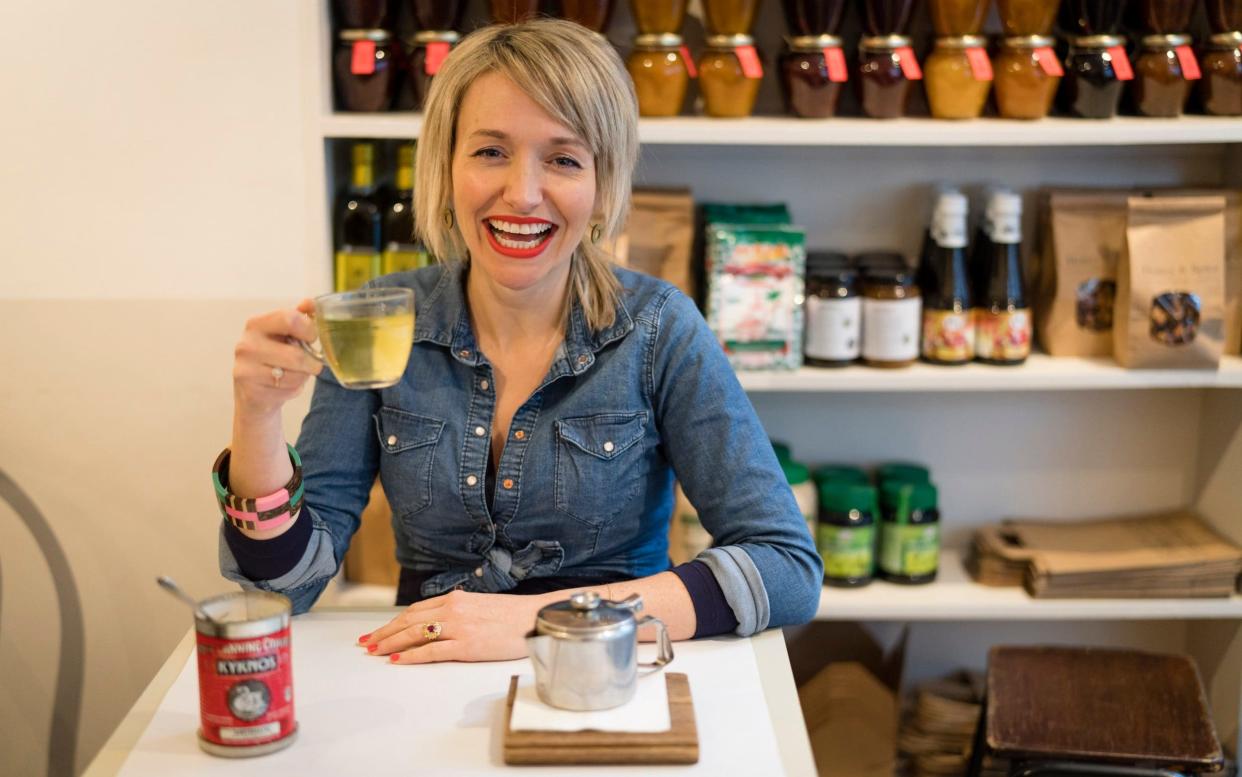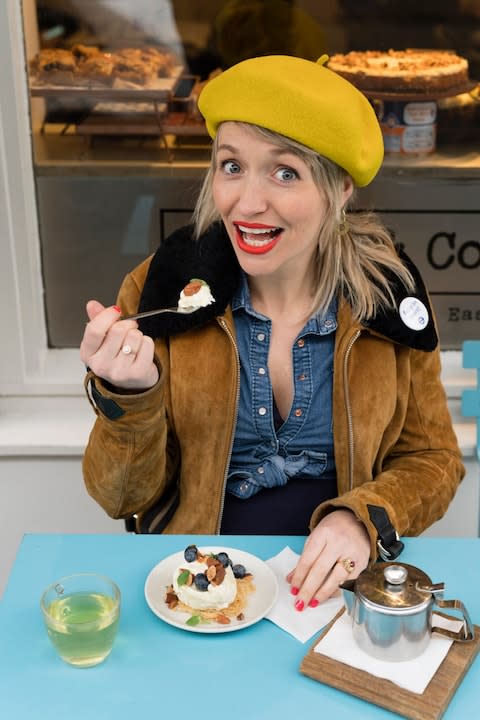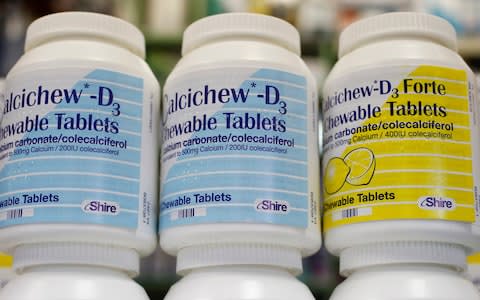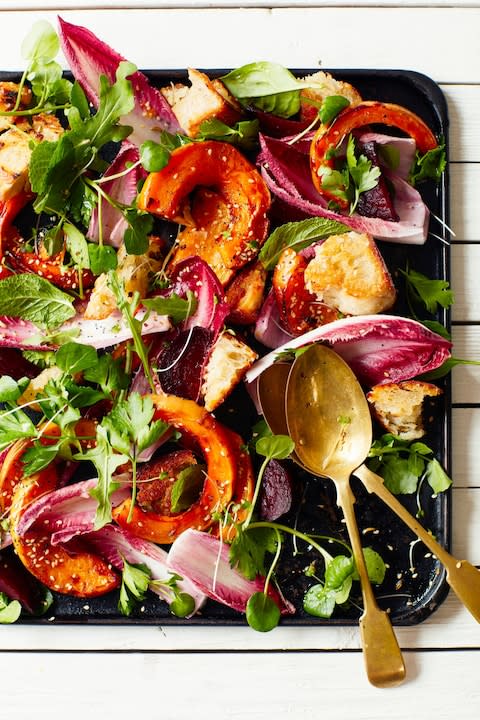Food Unwrapped's Kate Quilton on busting food myths - and why she won't let her child eat takeaways

As we await the arrival of our feta cheesecake for breakfast at trendy Fitzrovia eatery Honey & Co, a pregnant Kate Quilton is excitedly talking about everything cheese - not least all of the soft, gooey varieties she is looking forward to eating after giving birth to her first baby in three months’ time.
“It’s the most simple and impressive dessert you can make,” the presenter of Channel 4’s Food Unwrapped explains of the treat before us. “You whip up two different cheeses [cream cheese and feta] with cream and honey, make the bases, then put a dollop on top and dress it. It’s a showstopper.”
Quilton’s pristine red lips trill with foodie tidbits - no wonder, really, given that she has been a part of the documentary series, which co-stars Jimmy Doherty of Jimmy’s Farm fame, since it began in 2012, travelling the world to expose the truth about what we eat and how it is produced. When it comes to tuna, she urges, opt for tinned over fresh steaks; with salmon, choose wild fish over farmed ones. What would appear to be minor distinctions can actually, she says, have a significant impact on your health.
The 34-year-old has just returned from filming in Hawaii, where she was investigating the mercury levels in tuna. It was a piece of intriguing NHS dietary advice for pregnant women that sent her on an 18-hour flight across the Pacific with a protruding 27-week baby bump.
“You’re told you can eat four tins of tuna a week, but you’re only allowed to eat two tuna steaks,” she says. “Why is there this discrepancy? Is there more mercury in the fresh stuff?”

She discovered that in the UK, tins are predominantly made from skipjack tuna, a smaller version of the fish, while steaks are made from the larger varieties.
“To put it in really simple terms, the larger the tuna the more likely a higher level of mercury,” she says. The larger types, such as yellowfin, consume more food throughout their lives, thereby absorbing more of the poisonous metal.
“Food is my life and work and yet I have been astounded at the pregnancy guidance,” she says. “I surprise myself the number of times I end up googling, ‘Am I allowed this?’”
For someone who has spent more than a decade investigating every aspect of food from harvest to the effects it has on our bodies, that Quilton pays particular attention to what she eats is understandable - though cheesecake for breakfast may seem off-kilter. It’s certainly a healthier option than the stunt that gained her notoriety at university: trying Morgan Spurlock’s Supersize Me experiment, in which he ate McDonald’s meals three times a day for a month, with kebabs. Her week-long version left her feeling “depressed, listless and constantly thirsty,” she said at the time, not to mention the “near death experience” she had after chowing down on multiple doners a day.
Her meals these days are less lamb shish, more legume: Quilton eats around 10 varieties per day and two pieces of fruit, which she says people should “go easy on”. “It’s all about the vegetables, none of the junk,” she says. “Mix it up. Eat vegetables you haven’t tried before, eat the rainbow, all the colours.”

One iteration she is particularly excited about is mushrooms enhanced with vitamin D. Deficiency in the “sunshine” vitamin can cause lethargy, depression and a weakened immune system, and Public Health England last year advised the whole of the UK to increase its vitamin D intake during the autumn and winter. “We live under a grey cloud in the UK for most of the year, so a lot of us are vitamin D deficient,” Quilton explains. “There are some supplements added into foods to boost this, such as in breakfast cereal, or milk in the US, but it’s not really enough.”
Quilton's friend recently went through a period of feeling inexplicably awful: “his limbs were really heavy and his whole body was aching,” she recalls. “He was tested for all sorts, including cancer, and was beginning to think he had something really hideous.”
After a fortnight of tests, he was diagnosed with a lack of vitamin D. He added supplements to his diet and is now “absolutely fine.
“They essentially put mushrooms under a sunbed and the ultraviolet lights generate vitamin D in them,” she explains of the process behind these super-fungi, which are usually labelled with ‘High Vitamin D’ stickers in supermarkets. “They’re a bargain source of the vitamin.”
5 natural ways to get a shot of vitamin D
Quilton, who has also fronted Superfoods: The Real Story, Tricks of the Restaurant Trade and The Shopper’s Guide to Saving Money, traces her fascination with food back to a holiday in Tenerife, aged five. The family of six were at a restaurant one evening when she saw what appeared to be a cage of puppies near the kitchen. “That’s it,” Quilton remembers saying. “I don’t know what’s happening to those puppies, but I’m not eating meat anymore.
“From that point on, I was conscious of every meal. You can’t just eat anything.”
She has always maintained a healthy attitude towards her diet, and has spent the past decade looking at her career and health in tandem, taking up running the three miles a day to Channel 4’s offices, where she became one of its youngest ever commissioning editors, aged 25. Suffolk-bred, Quilton started her career at BBC Somerset, where her beat was largely farming, and transitioned from behind the screen to in front of it after moving to London.
She has been faithful to Channel 4 and says they have been “hot on pay equality”, recalling a conversation with colleagues about the problem as early as 2012. “The bench marking that’s happening right now should have happened a long time ago,” she says. “Without a doubt it was a long time coming and it’s utterly unacceptable that women who are doing the same job as a fellow are getting paid significantly less.
“To my knowledge,” she adds, “I haven’t been a victim.”

The channel has also been supportive throughout her pregnancy - her producer was the one who encouraged her to announce her news during the Food Unwrapped Christmas Special. That said, Quilton admits that one of the reasons she waited to have her first child until now, despite pressure from her husband, 43-year-old actor James Lance, was to build her career.
Will she be taking a year’s maternity leave? “No, no, no, no. We’ll see how it goes. I’m lucky that I can go back to work for a day or two a week and I’m in a lovely situation: my husband will be very hands on and my Mum is a real-life Mary Poppins.”
Also lucky for Quilton is that Lance, who has chalked up credits in I’m Alan Partridge, Spaced and Smack the Pony, loves cooking, recently rustling up a “delicious panzanella with all of these amazing ingredients in it” - a marked change from the man who once described “an American Spirit Light with a coffee in the morning [as being] the only essential ingredient to my breakfast.”
She hopes the new arrival, whose sex they’re keeping a surprise, will share its parents’ love of eating. “We want to encourage that passion in food,” she says - though some things will be off limits. “McDonald’s? I think that’s one they might have to talk their Dad into. It’s not going to happen with me, sorry kids.”
Food Unwrapped is on tonight on Channel 4 at 8:30pm